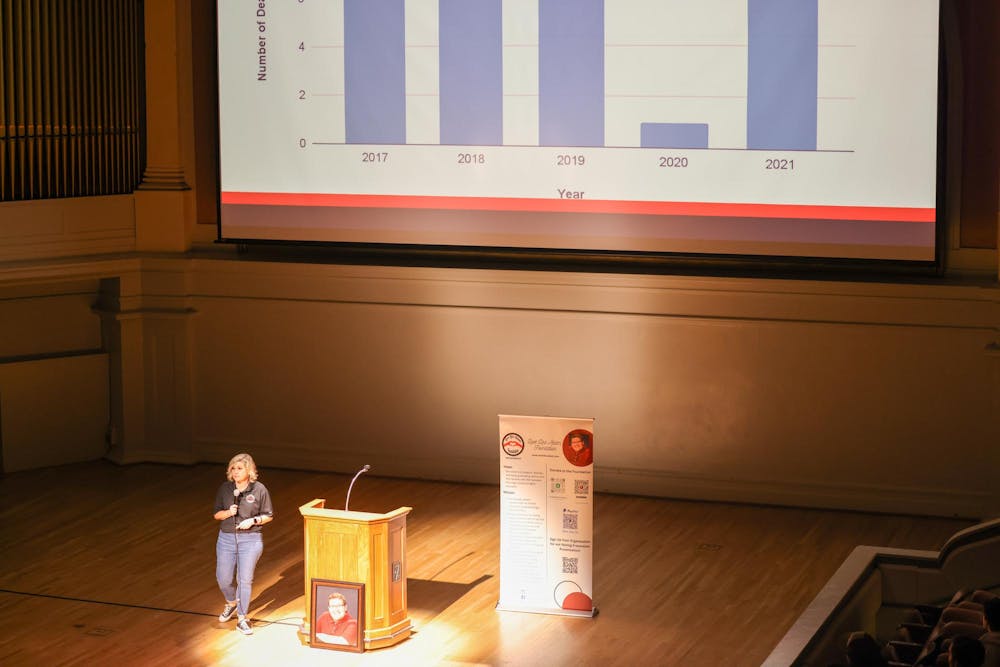Courtney White, cousin of Adam Oakes, a Virginia Commonwealth University student who died due to alcohol poisoning during a fraternity hazing incident in 2021, discussed hazing prevention and warned attendees about the consequences of hazing at a Monday evening presentation. The event kicked off the first of the University’s events for National Hazing Prevention Week — a period for universities to raise awareness and increase education about hazing.
White is president of the Love Like Adam Foundation, a non-profit organization established in honor of Adam to support, educate and equip students, families and law enforcement officers with hazing prevention education. White spoke on Adam’s story prior to the hazing incident, including his passion for high school sports, and showed a video explaining the circumstances that led to Adam’s death.
In the video, members of Adam’s family and the Delta Chi fraternity recalled how members of the organization instructed Adam to drink a full bottle of whiskey before putting him to sleep on a nearby couch, where he subsequently died of alcohol poisoning. White noted that Adam’s death was preventable had members of his fraternity been more urgent in calling 911.
In addition, she shared methods of preventing hazing and discussed Adam’s Law — an anti-hazing law passed in 2022 in Virginia following Adam’s death. The law requires hazing prevention education at all Virginia colleges, legal immunity for bystanders who call 911 for help when hazing is occurring and also requires that universities post annual hazing reports online. White noted the dangers of hesitating to call for help and shared stories of other students who were physically and mentally harmed by hazing in order to encourage students to prevent these incidents.
“You are the one that can make a difference in saving a life.” White said. “You are the people that we wish Adam had with him that night, that would have called 911 and gotten him help.”
White also noted the severe consequences that hazing can have for perpetrators, describing the punishments 11 members of Delta Chi faced after Adam’s death, which included 250 hours of community service, a one year probation, expulsion from V.C.U. and participating in hazing prevention presentations with the Foundation. She also said that victims of hazing can personally sue fraternity members, and shared that during that process, the Oakes family was able to subpoena text messages from Delta Chi members leading up to Adam’s death.
The presentation included some of these messages, which included members making fun of Adam’s weight and joking about him dying while he was already unconscious due to alcohol poisoning. White said that everything sent or posted online can be accessed if an incident occurs during hazing, and shared how saddened she was to read the nearly nine pages of similar messages that were subpoenaed.
“I had someone in my last session say, ‘Do you think that they got enough? Were you hoping that they went to jail?’” White said. “And I said, ‘Not until [I saw these messages].’ They may not have set out that night to hurt him, but they definitely picked him apart … They [made him drink] a bigger bottle because he was a bigger size … they targeted him because of his size, and then took it too far because they assumed he could handle more for his size.”
White shared that she believed there has been a rise in reporting of hazing not because hazing incidents are increasing, but because more students are aware of hazing, able to recognize it and willing to speak up to prevent it due to increased prevention education. She also said that the best thing students can do to combat hazing is to change their own behaviors and continue to report incidents.
“Keep your friends close. If you notice changes in them, such as their clothing, personality [or] sleep… have a conversation with them. Talk to them about it,” White said. “You are the one that can make a difference in saving a life.”
One attendee asked if it was challenging for Adam’s family to work with the Delta Chi members who had to participate in presentations for the Foundation as part of their sentencing. Eric Oakes, Adam’s father, shared that it was difficult for him personally, but that he also saw that most of the members felt remorse over what had happened.
Second-year College student Ethan Abel said that he attended the event with his fraternity brothers to learn more about hazing prevention, and that he was struck by how hazing incidents — such as the one which caused Adam’s death — could happen anywhere.
“I think what was extremely sobering was how human everyone was and how easily you could envision something like that happening to people you know, or at a place you know.” Abel said. “And it's scary, because you have to [be aware] that in situations where you may not expect anything to be wrong, things like this could always be going on without anyone knowing.”
Throughout the rest of the week, the University has continued to host events such as a webinar focused on alcohol’s role in hazing and a hazing documentary screening and discussion to raise awareness for National Hazing Prevention Week.







